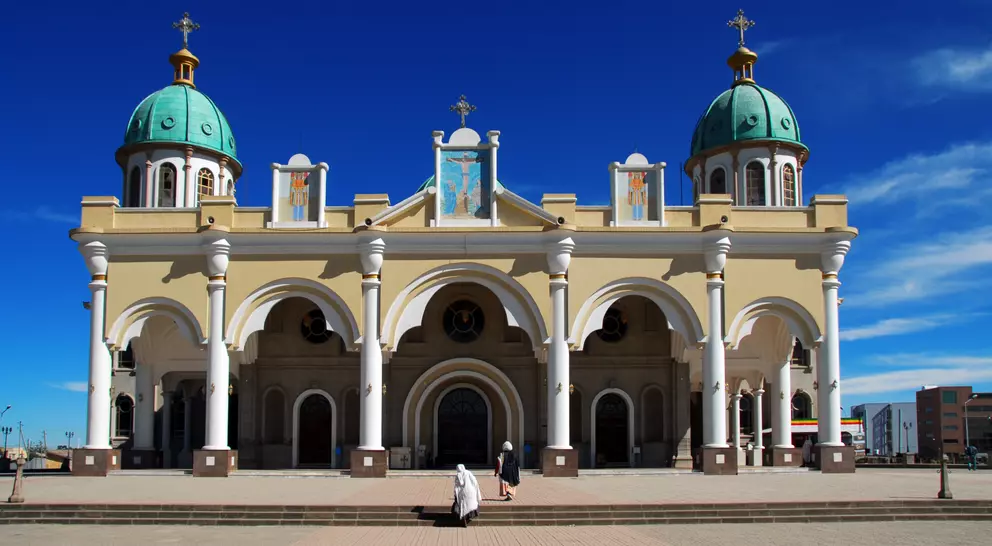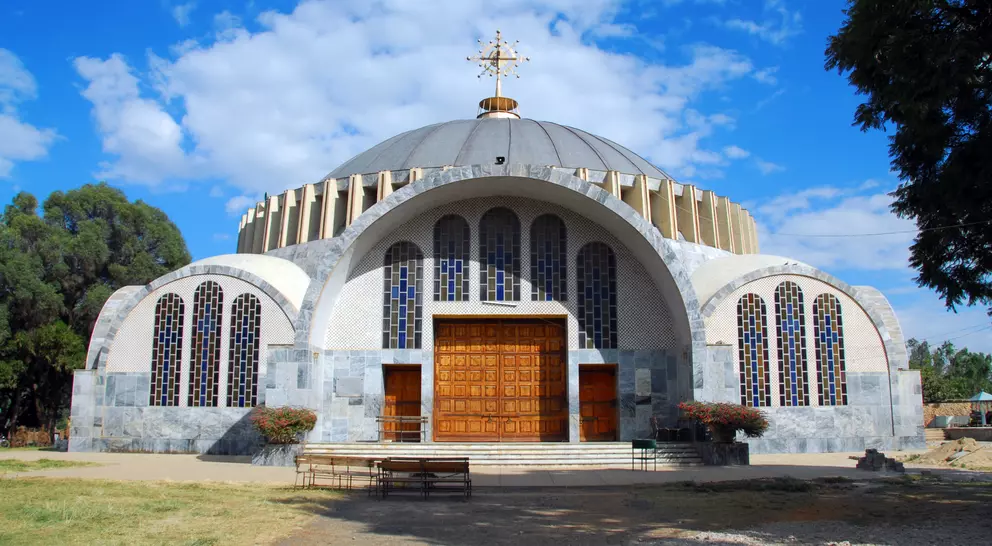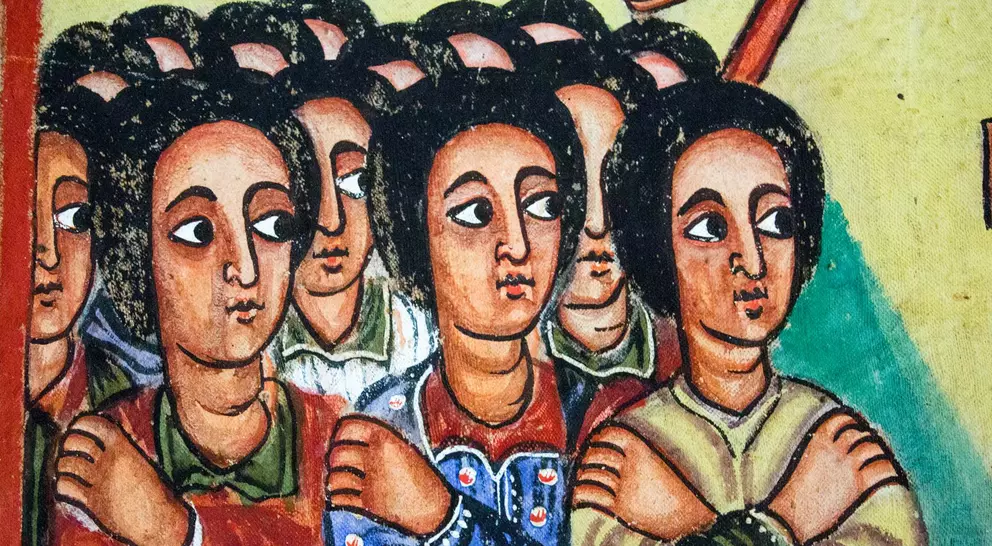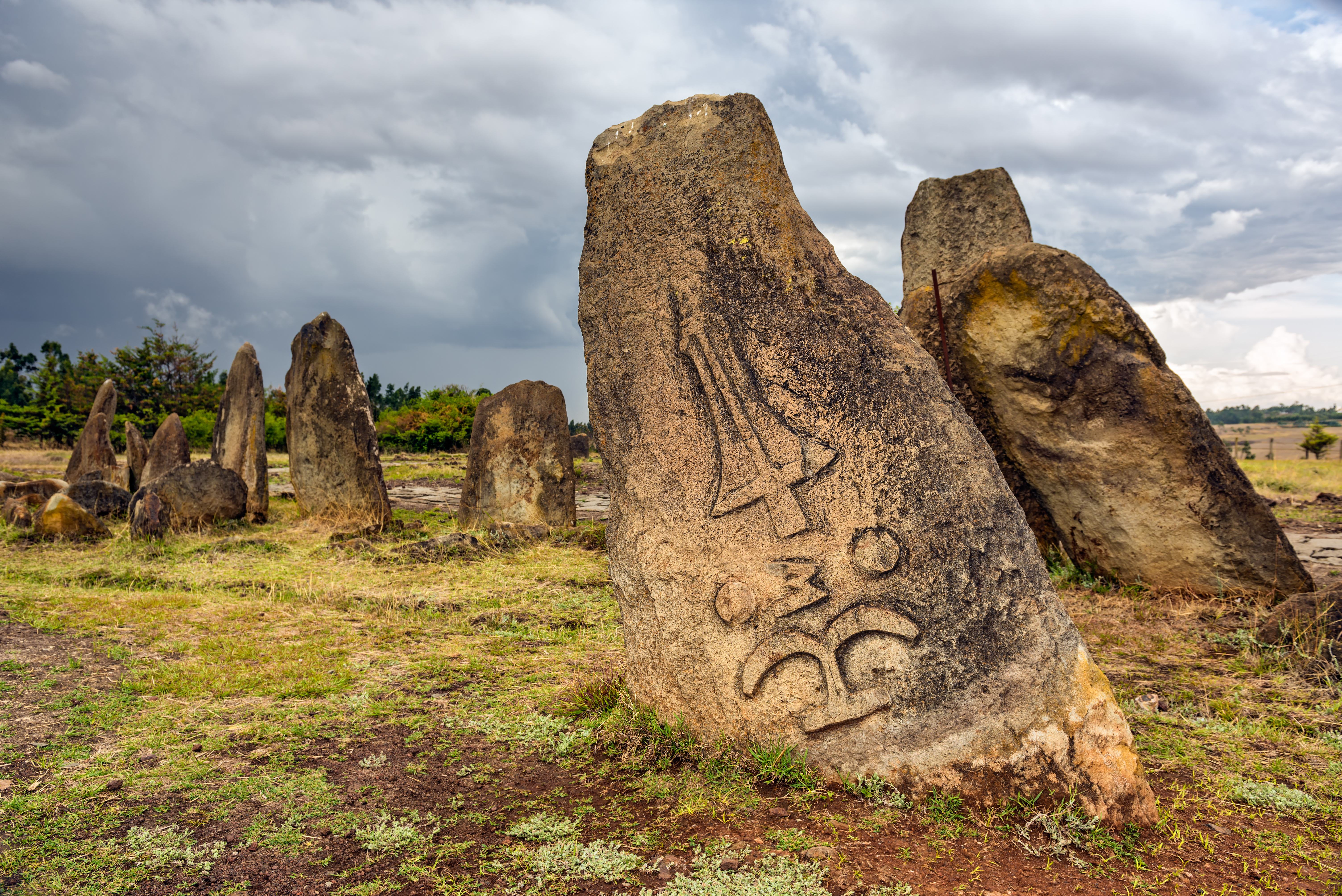Yes. US and Canadian citizens need a visa before travelling. Apply online for an Ethiopia eVisa (single- or multiple-entry) and travel with a passport valid at least 6 months beyond entry. Visa rules can change—confirm details on the official eVisa site just before you book. If transiting through a country with yellow fever risk, proof of vaccination may be required on arrival.
Discover Tailor-Made Ethiopia Vacations
A land of ancient cultures, dramatic landscapes and immersive traditions waiting to be explored on a custom trip to Ethiopia.
Ethiopia is a land of striking contrasts, nestled in the Horn of Africa. It combines breathtaking scenery with a rich history, spanning the towering mountains and lush highlands, to the dramatic valleys and age-old rock-hewn churches. Bustling markets, timeless traditions and warm hospitality make every journey here unforgettable.
Featured Highlights
- Trek through the dramatic Simien Mountains, home of the rare Ethiopian wolf
- Stand amidst Lalibela's silent, yet sublime, ancient rock-hewn churches
- Gaze on Axum's towering obelisks, echoing a civilization two millennia old
- Wander the bustling Addis Ababa, where markets, art, and tradition intertwine
- Explore the Danakil Depression's surreal salt flats, volcanoes and glowing pools
- Join a traditional coffee ceremony or the vibrant Timket festival
Featured Ethiopia Trip Ideas
Journey through time-worn traditions and geological marvelsEthiopia invites you into a world where nature and heritage converge. Picture a journey from the towering Simien Mountains to the awe-inspiring terrain of the Danakil Depression, Lalibela's rock-hewn churches, and Axum's ancient obelisks. Or venture to Addis Ababa and feel the modern energy pulsing amid the traditional markets, while lively coffee ceremonies and festivals, such as Timket and Meskel, offer genuine cultural connections. Every moment in Ethiopia reveals its unique character and wonder, whether you're travelling across its diverse ecosystems, from highland rainforests to desert vistas, enjoying the warm hospitality of Ethiopia's people, renowned for their generosity and inviting spirit, tracing humanity's cradle in the Rift Valley, or joining the spirited Great Ethiopian Run in Addis Ababa.
Essential Ethiopia: Exploring the Cultural South
Addis AbabaEthiopia Escape with Lalibela's Rock-Hewn Churches
Lalibela, Lalibela Rock-Hewn Churches, and Addis AbabaDon't see the
perfect trip idea?
Request a custom quote.
Turn your travel dreams into reality with Goway. Our customized vacations take travellers to all corners of the world.
What do Goway's travellers say?

Get to know Ethiopia before you go.
Best Time to Visit
Ethiopia’s beauty shifts with the seasons, offering globetrotters something remarkable at any time of year. Every journey in Ethiopia is shaped by captivating landscapes, a warm climate, and exciting cultures, from mountain treks to ancient festivals.
The dry season, from October to February, is perfect for trekking in the Simien and Bale Mountains, where clear skies and cool air create ideal conditions for hiking and wildlife encounters. This is also the best time to explore UNESCO treasures like Lalibela’s rock-hewn churches and Axum’s obelisks, without the interruption of rain.
From June to September, the rainy season transforms Ethiopia into a lush green tapestry. It’s a rewarding time to discover the traditions of the southern tribes and witness rural life in full rhythm with the land.
Festivals such as Meskel, Timket, and Ethiopian Christmas enrich the calendar, particularly in September when the rains ease and travel becomes especially comfortable. For quieter journeys, the shoulder months of April to May and September to October offer fewer crowds and a gentler pace, allowing you to experience the country’s cultural and natural wonders with ease.
What do the experts say?
If you are looking to experience something truly unique then plan your trip to coiencide with Timkat (Epiphany) on January 19th for colorful processions of priests carrying the Tabots (Ark replicas)
When in the Addis Ababa, coffee lovers should make sure to visit Aster Bunna: A cozy and long-standing coffee house renowned by locals for serving some of the best-quality Ethiopian coffee in the city.
Ethiopia is one of the few places in the world that uses a 13-month calendar and its own 12-hour clock system, meaning the country is currently seven years behind the rest of the world.
Places To Go
Handcrafted journeys to our most popular places to visit in Ethiopia
Addis Ababa
Founded little more than a century ago, Addis Ababa, which in the Amharic language means ‘New...
Founded little more than a century ago, Addis Ababa, which in the Amharic language means ‘New Flower’, is not only the diplomatic capital of Africa and a thriving metropolis but also a growing city...

Axum
The original capital of the Kingdom of Axum, it is one of the oldest continuously inhabited places...
The original capital of the Kingdom of Axum, it is one of the oldest continuously inhabited places in Africa on an Ethiopian vacation. It was a naval and trading power that ruled the region from...

Bahar Dar
Bahir Dar is the third largest city in Ethiopia after Addis Ababa and Dire Dawa. It is the capital...
Bahir Dar is the third largest city in Ethiopia after Addis Ababa and Dire Dawa. It is the capital of the Amhara region inhabited by the Amhara people, the country's ethnically and geographically...

Gondar
Gondar is a royal and ancient historical city in Ethiopia. It was the home of many emperors and...
Gondar is a royal and ancient historical city in Ethiopia. It was the home of many emperors and princesses who led the country from the 12th century to the last decade of the 20th Century. It is also...

Simien Mountains
The Simien Mountains in northern Ethiopia, northeast of Gondar, are part of the Ethiopian Highlands...
The Simien Mountains in northern Ethiopia, northeast of Gondar, are part of the Ethiopian Highlands. They are a World Heritage Site and include the Simien Mountains, National Park. The mountains...
Travel Styles
Explore Ethiopia by Travel Type
Ways to Travel
Discover your perfect travel style—crafted for every dream and journey.

Ways to Travel
Discover your perfect travel style—crafted for every dream and journey.
Frequently Asked Questions
Do I need a visa or special permits to enter Ethiopia?
What language is spoken locally? How widely is English understood in Ethiopia?
Amharic is the federal working language, alongside many regional languages such as Oromo, Somali, and Tigrinya. English is taught widely and used in tourism and business, so you’ll usually get by in hotels, with guides, and on Goway tours; carry key phrases in Amharic for markets and rural stops.
What are the must-see attractions in Ethiopia?
Lalibela’s rock-hewn churches feel otherworldly at dawn; the Simien Mountains deliver sky-high viewpoints and gelada encounters; Gondar’s royal castles and Lake Tana’s island monasteries tell centuries of history. Culture lovers add Harar’s old city; adventurers eye the Danakil Depression’s surreal salt flats and hydrothermal colours. Goway itineraries cover these classics and more.
Is Ethiopia safe? What should I keep in mind while travelling there?
Conditions vary. The US advises “Reconsider travel,” and Canada advises “Avoid non-essential travel,” with regional no-go areas. Expect periodic checkpoints, internet or communications disruptions, and demonstrations. Keep plans flexible, follow local news, use trusted guides, and confirm regional safety with your tour operator close to departure. Health-wise, ask a travel clinic about malaria prevention and yellow fever requirements for your routing. High-altitude Addis Ababa can leave you short of breath on day one—take it easy.
What’s the best way to travel within Ethiopia?
Distances are big, so combine domestic flights with targeted road trips. Ethiopian Airlines links major hubs like Addis Ababa, Gondar, Lalibela, and Axum; overland, expect slow going on rural stretches and occasional livestock on roads. Driving is on the right; most visitors hire a driver/guide. For luggage and routing, check your Ethiopian Airlines fare rules before you pack.
What Ethiopian cultural customs should I be aware of?
Greetings are warm—use the right hand to give/receive items. If invited to a coffee ceremony, accept at least the first cup and linger; elders are often served first. In Ethiopian Orthodox churches, remove shoes, dress modestly (a light scarf is handy), and follow your guide’s lead. Photography at religious sites may require permission.
What should I wear/pack for Ethiopia’s climate?
Most trips mix cool highlands and hot lowlands. The drier main travel season is roughly Oct–Mar; long rains fall Jun–Sep. Pack breathable layers, a fleece for crisp highland nights, sun hat and strong SPF, and sturdy walking shoes. For Danakil or the Omo lowlands, add a very light long-sleeve, electrolytes, and a scarf for dust. A Type C/F adaptor (220V, 50Hz) will charge your gear.
Unlock more by subscribing to our newsletter
With our newsletter, you’ll get access to regular communications that inspire you and help you explore the world your way



